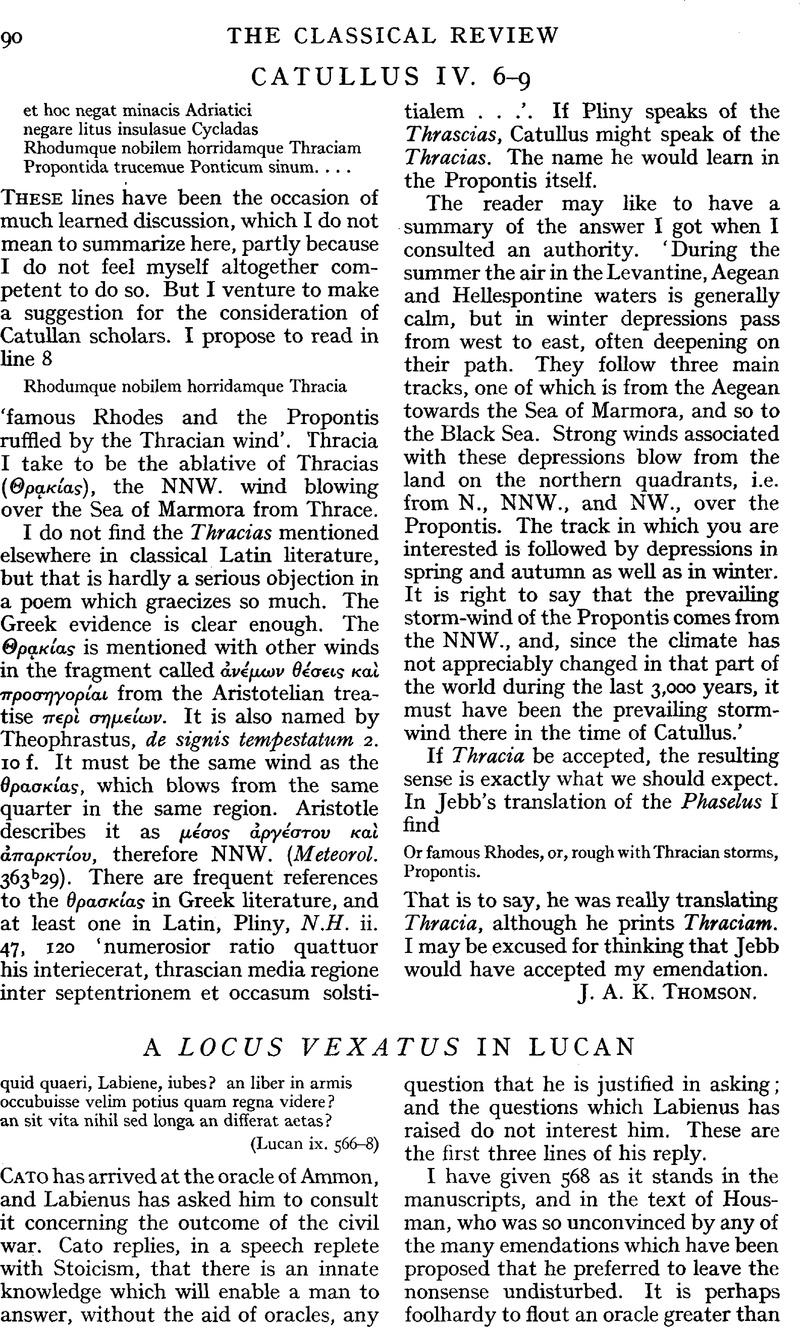No CrossRef data available.
Article contents
A Locus Vexatus in Lucan
Published online by Cambridge University Press: 27 October 2009
Abstract

- Type
- Review Article
- Information
- Copyright
- Copyright © The Classical Association 1950
References
page 91 note1 See Oudendorp, ad loc.
page 91 note 2 Adversaria Critica, ii. 132–3.Google Scholar
paeg 91 note 3 The words nihil posse honestum are possible Latin but impossible Stoicism, and correspond to nothing in Cato's speech. What has happened is clear enough: a copyist wrote the nihil after vivimus, and on returning to his exemplar continued with the word following the nihil after nocere, namely, posse: a simple case of omission through haplography. An exact parallel occursat iii. 658: ‘si viscere permixtus legimus, scilicet cum viscere; si viscera permixtus, id est permixta viscera habens’ c; ‘si viscere …, si viscera permixtus, id est permixta viscera habens’ a. These two passages prove that c cannot have taken its common matter from a. That the reverse is not the case is shown by the evidence quoted in n. 5, below.
page 91 note 4 Rivista di Filologia, xxxi (1903), 463 ff.Google Scholar Cf. c and a ad B.C. i. 1.Google Scholar
page 91 note 5 In Studi Italiani di Filologia Classica, 11 (1903), 51.Google Scholar
page 92 note 1 Contrast the passages of Servius and Martianus Capella with those of Priscian adduced by Usener, ad loc.
page 92 note 2 ‘hospitis ille ciet nomen, vocat ille propinquum.’ Propinquum MG; propinqui ZPUVc: ‘Vocat Ille Propinquum π κοινοῦ ”nomen” accipimus’ a.
page 92 note 3 e.g. at viii. 756 and ix. 710. At iii. 237 a and c complement each other. From a comparison with the scholium (also from Σ) on v. 517, and Isid. Or. xvii. 7. 57–8 I believe the words of a ‘Agroetes significantur Indiae ulterioris populi, qui cannarum viridium caudicibus tunsis sive tritis dicuntur exprimere sucos’ to be from σ.
page 92 note 4 I have not been able to see Rinkefeil's, W. dissertation (Dresden, 1917) De adnotationibus super Lucanum, which is said to treat the relationship of a to c.Google Scholar
page 92 note 5 Nutting (A.J.P. Iii (1931), 49 ff.) holds that nihil at Luc. iii. 40 has a similar meaning. I wish I could believe him.Google Scholar
page 92 note 6 Cf. Sen. Epp. 93. 4 ‘licet aetas eius imperfecta sit, vita perfecta est’; Plin. Epp. v. 14.5 ‘quod non tam aetatis maturitate quam vitae merebatur’; Cic.Google Scholar adfam. x. 1. 1 ‘mea vita, cui satisfeci vel aetate vel factis’.Google Scholar
page 92 note 7 Cf. Quint. Inst. xii. 10. 13 (Radermacher): sit tamen bH; sed tamen BnBgNEP.Google Scholar
page 93 note 1 διαφέρειν in this sense is occasionally used personally, e.g. Plut. Caes. 65; Gal. U.P. ix. 5; Procl. in Plat. remp. ii. 241. 17 (Kroll)Google Scholar; and perhaps Eur. Hec. 599.
page 93 note 2 Housman, ad loc, and Postgate in C.R. xxx (1916), 142 ff. give other examples, to which I would add, as having some resemblance to the case under discussion, vi. 652–3 ‘dubium est, quod traxerit illuc aspiciat Stygias an quod descenderit umbras’.
page 93 note 3 Loc. cit.
page 93 note 4 See Bailey, ad locc.


